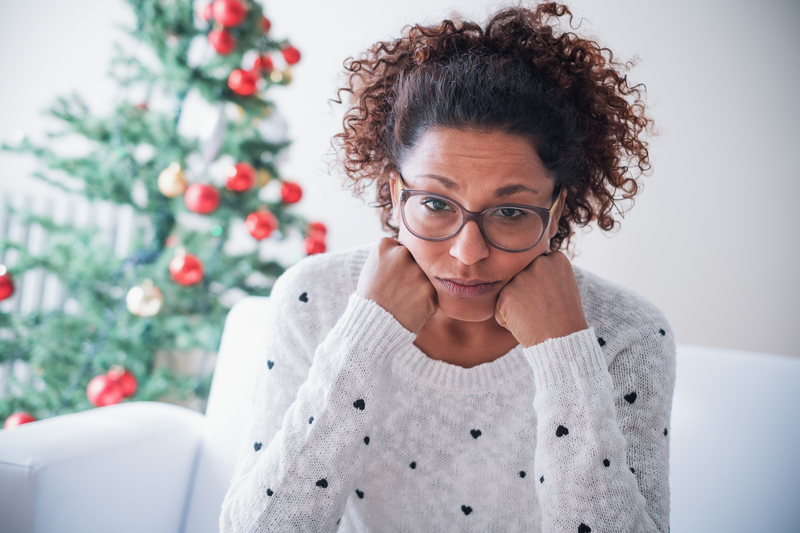18 Healthy Ways to Beat Holiday Depression and Anxiety

Many people consider the holidays to be the happiest time of the year. They love the music, the lights, and the family gatherings, for instance. Yet, others find this time of year to be the most trying. For example, those who have gone through a recent loss may experience profound holiday depression. Or, finances may be especially tight for some, meanwhile others are spending the holidays alone. Some find their anxiety is triggered by all of the additional expectations and stimulation. And still others feel all the feels—from the joy and excitement to the sadness and anxiety this season can bring.
On top of that, it would be an understatement to say 2020 has been unusual. This year has brought confusion and uncertainty for millions, if not billions, of people. Many have experienced the loss of loved ones or jobs, careers, businesses, homes, and certainly connections. Others are struggling to regain their health or get their financial feet back under them (or wondering if they ever will). The lack of perceived security combined with increased social isolation can make this season feel even more difficult.
Not surprisingly, Americans have reported feeling sadder in 2020 than in previous years, with 27% saying they felt a lot of sadness the previous day. 1 This can be even worse for the 43% of Americans who are single and the 27% who live alone. 2
Further, up to 14% of people experience seasonal depression or “winter blues,” around this time of year, 3 which can increase the feelings of depression. This can make normal tasks—like getting out of bed, cooking for yourself and your family, or taking a walk—difficult. You may also find you are just tired, less interested in things you enjoy, or are struggling to concentrate.
Rest assured, no matter how you’re feeling this season, they’re most likely normal and shared by many others. Of course, that doesn’t make things easier, and it doesn’t make those feelings go away completely (although it might help a bit to know you’re not alone).
The Hope For a New Normal
While many people are striving to find a “new normal” this year, as the number of COVID-19 cases (as well as the number of deaths) have increased across the country (and in many parts of the world), the CDC has urged folks to forgo travel this holiday season. Thus, even smaller plans and gatherings are being postposed or even completely canceled. For folks who are feeling alone and isolated, limiting contact with loved ones can be a real downer. For others, trying to navigate who to spend time with safely can be a real challenge.
Other people may have a lower risk, and the precautions advised may seem unnecessary—stupid even. Yet, there are many people who are at a higher risk for long-term health complications or who have elderly relatives who are at greater risk, and it can feel really scary right now. Others have friends and family who have recently been infected, and that’s served as a strong reality check for how serious the situation can be.
No matter what, these times are unlike ever before, and all of us are just trying to make the best decisions we can with the information we have. That can have a real impact on our collective mental health.
In fact, research from the American Psychological Association released this October found 65% of adults feel stress from the uncertainty in the U.S. right now. 4 In a similar survey from the CDC, 41.4% of adults have reported anxiety or depression, the highest reported level since they began the survey in April of this year. 5
Many folks feel frustrated or disappointed, as they have been isolating themselves (i.e., social distancing) in the hopes of things being back to normal, so they could celebrate the holidays with their families. Yet, with new cases and deaths from COVID-19 still a reality, that isn’t likely for many.
Your situation or opinion may differ drastically from your neighbors, family members, or friends, but chances are pretty solid that the 2020 holiday season will be different. And if you’re feeling even more depressed or anxious this year, you are certainly not alone. While we can’t just snap our fingers and end the situation we’re in, we can take steps to help fight off holiday depression and anxiety to make the season as bright as possible this year.
First thing’s first: prioritize your own mental health by…
BREAKING: Forget Taking Collagen, Try This 21-Second Trick for Healthier Skin & Hair Instead
18 Healthy Ways to Beat Holiday Depression
1. Feeling the Feelings
Sometimes you want to just curl up and escape all the icky feelings and pretend everything’s just fine. Yet, the best way to actually deal with your feelings is to, well, feel them. Check in with yourself and ask how you’re feeling, name the feeling, and then allow yourself to just be. If you’re frustrated that you can’t be with your family, then allow yourself to be frustrated, disappointed, sad, angry, or fed up. From there, you can start to take steps to help yourself feel better.
You may find that you’re not ready to feel better. That’s okay too. Set a timer for 10 to 20 minutes and let yourself be where you are—even if that isn’t in the best place. Once the timer is up, move onto something else. Take a walk, work out, prepare a healthy meal, or call a friend or family member.
That said, this is for run-of-the-mill sad or frustrated feelings. If you’re in a dark depression or beginning to consider self-harm or suicide, please seek help immediately. You can call a personal health professional or the National Suicide Prevention Lifeline at 800-273-8255. You are not alone, and help is available. (This line is also available for people who are worried about a friend or loved one or for those who simply need immediate emotional support.)
2. Opening Up
Once you’ve acknowledged your own feelings, reach out to others to express them. We often feel like we’re in our own worlds when we’re in pain. Sharing feelings can help us feel less alone and isolated.
It’s also vital to be open to new ideas and traditions. As the saying goes, “Happiness isn’t having what you want, it’s wanting what you have.” This holiday season may differ from how you want the holidays to be, so it’s a great opportunity to create new traditions and experiences. (And it’s good practice to build greater resilience to challenges, as circumstances are bound to change throughout your life.)
Creating new holiday traditions may make this holiday season better than you could have imagined. The key is to make the effort to connect while letting go of past expectations and opening your heart and mind for something new.
3. Making Time for Movement
When you need to lift your mood, decrease stress, or overcome depression or anxiety, one of the best things you can do is move your body. As fitness legend Bill Phillips has said, “Food is the most abused anti-anxiety drug, and exercise is the least utilized anti-depressant.”
Take a walk, have an at-home dance party (blasting your favorite holiday tunes, if the mood strikes you), or get your heart pumping or muscles shaking with an intense workout. Research has found, for example, that walking in nature for a mere 10 minutes is enough to help you feel happier and reduce the negative effects of stress. 6 And 30 minutes of cardiovascular exercise can provide an immediate boost to your mood. 7
4. Coping Ahead
When you’re feeling sad or anxious or dealing with any negative emotions, it can be difficult to come up with ideas in the moment to help you deal with how you’re feeling. So instead, be proactive and come up with a plan for how you will cope should you start feeling the feels. Making a plan ahead will prevent you from sitting around and wallowing alone, thinking about how much this year sucks because you’re missing your favorite holiday party, baking cookies with the family, or opening gifts together.
For example, you could create a virtual “bake-off,” plan for a favorite hike, or schedule a specific time to FaceTime with your parents, grandparents, siblings, and extended family. You can also schedule other pleasant activities like curling up with a good book or movie, stargazing on a clear night, listening to soothing music, or anything else you enjoy that eases your mind.
5. Creating Connections
For most of us, if we’re honest, it’s not the gifts or special desserts we look forward to at the holidays. It’s the time that we spend together with people we care about. While it may not be the same, it is still possible to create connection. Maybe it’s a masked-up walk (or workout) outdoors with a friend or actually having time to send off Christmas cards this year. Create even more connection by sharing some of your favorite memories from this year or past holidays. Even a text or email can send cheer to loved ones (and provide cheer for you as you send it), though a video call is likely even better to enhance the interaction.
If you’re missing family, maybe now is the time to get to know your neighbors better. How about a social-distanced party from their patio or backyard to yours? Or, instead of exchanging gifts, how about sending care packages to far-off family members? (As the saying goes, it’s better to give than receive.)
Still feel like your heart is ripping open every time you see a holiday decoration? Flip the script and leave the holiday decorations in their box and maybe even decorate for a different holiday this season—perhaps a holiday you’re really looking forward to, like Easter, Independence Day, or Halloween. And instead of watching your favorite holiday movies, pull out other favs like your go-to scary movie. Just find something that’s fun and brings you joy.
Or, skip past this year and start making big plans for what you’ll do next year or next time you can meet in person. Go into details and elaborate on when, who, where, and what you’ll do so you can build up excitement and anticipation. How about a destination holiday next year?
6. Limiting the Drinks
At the end of (or in the middle of) a stressful day, many people reach for an alcoholic drink (or perhaps smoke or drug). One drink may not hurt, but if you find yourself overindulging, it’s time to cut back. Alcohol is, after all, a depressant, which can make you feel worse, make problems appear larger than they are, and lower your energy levels. Leave the booze at the liquor store and perhaps choose a refreshing mocktail instead.
If you really need something to take the edge off, consider trying deep breathing, meditation, or gentle yoga instead. All of these can be much more effective ways to cope with stress than having that drink.
7. Creating Experiences
Social isolation can lead to depression and anxiety. Depending on where you live, you may be unable to even get out to your favorite café or bookstore, and that can feel even more isolating. Why not visit someplace you’ve always wanted to go—online? Numerous museums, galleries, and even cities are now offering virtual tours, and some theater groups are now offering virtual performances. For example, many ballet companies around the world are offering virtual Nutcracker performances. There are also virtual wine tastings, cooking classes, and workshops on a variety of topics to help you stay active and engaged from home.
RELATED: How to Get Keto Results WITHOUT the Keto Diet
8. Re-enforcing Your Boundaries
While health experts are telling us there’s light at the end of the tunnel, they’re still strongly advising that this year be different: we need to work together to stay healthy and protect those who are most vulnerable. Still, there are people who may push (like only family and close friends can) to get together.
Remember, it’s okay to say no and to do only what you’re safe and comfortable with. It can, however, be really stressful for families when not everyone is on the same page when it comes to how serious to take the current public health situation and the stipulations put in place. Be kind but firm and explain the precautions you’re following. Don’t judge others who may be taking them more or less seriously. (Shaming never works and can even make people more stubbornly stick to their positions despite evidence to the contrary.)
You can always ask yourself if you’d rather be right or happy, knowing that long-term relationships keep you happy. That doesn’t mean you need to let others walk all over you. You also don’t have to lecture others or allow them to do so to you. Just let them know you look forward to getting together with them when this is all over.
Prioritize your own mental and physical health, understanding that sometimes people see things differently even given the same information. And right now, there’s also a lot of conflicting information available. Chances are good that your friends and family are also feeling the stress of the holidays, confusing expectations, and perhaps feeling sad or depressed too.
Of course, setting boundaries isn’t just something you do during a pandemic. This is a great time to learn to kindly say no so you don’t overschedule and overwhelm yourself any time of the year. Feeling overwhelmed with too many commitments or saying yes to something you really don’t want to do out of obligation can increase anxiety, depression, and even lead to emotional breakdowns.
9. Getting Enough Rest
Quality sleep is key to not just physical health but to mental health. Being well rested can lift mood, increase energy levels, and help you take on bigger challenges. Make good sleep hygiene and a healthy sleep routine non-negotiable. On the other end of the spectrum, however, is too much sleep. It’s all about a healthy balance, Goldilocks, so ensure you get the right amount of sleep for you (somewhere between seven and nine hours per night).
10. Giving of Yourself
Another great way to feel better is to simply give to others. Do something nice or kind for others: volunteer, create a care package for a loved one, give blood, donate to a charity or food bank, help a friend or neighbor with a home or yard task, practice random acts of kindness, grab some groceries or a prescription for an elderly neighbor, support a local small business in your community, or pay a kindness done to you forward. Focusing on the needs and feelings of others means you’re less focused on yourself and what’s not going right for you right now.
11. Sticking to a Budget
If you find yourself trying to buy your way out of discomfort, you’re not alone. Before you start shopping for gifts or food, put together a budget to spend only what you can afford to help avoid financial woes, post-holiday depression, and anxiety for the future you.
You can’t buy love or happiness. Instead, consider donating to a charity in someone’s name, make and give homemade gifts and crafts, or start a family gift exchange.
12. Fueling Up on Healthy Foods
Sometimes your brain may tell you that it’s better to eat your feelings rather than face them. Don’t believe the lie! Instead of grabbing a tub of ice cream, reach for vegetables, fruits, and other healthy foods, and avoid overeating or overindulging, which can lead to physical, mental, and emotional discomfort. Some foods, like seafood, leafy greens, and winter squash, can even help lift your mood.
13. Practicing Gratitude
Another surefire way to feel better is to create a gratitude practice. You can list what you’re grateful for every morning or every evening before you go to sleep. Better yet, say thank you throughout the day anytime you notice the good things. The practice can help you embrace the joy of your day-to-day life, even when you’re feeling sad or anxious.
Start by listing just three simple things you’re grateful for every day this month—even the little stuff, like watching the sunset, warming up in front of a fire or heater, or that you can slow down and take a deep breath.
Don’t forget the small interactions either: someone holding a door open, letting you merge onto the highway, or wishing you a happy holiday.
14. Getting Warm
Getting and staying warm has been shown to help improve mood. Wrap yourself in a cozy blanket, sip on a warming cup of tea, or slip into a warm bath or shower to help lift your mood.
15. Seeking Touch
Did you know that tactile stimulation can almost immediately improve mood? Hug your partner, kids, roommate, or even a tree. Pet your dog, cat, or other companion animal. Give yourself a massage, cuddle up with a body pillow or weighted blanket, or dance (or at least sway) to some music.
While it’s not “touch,” ASMR (Autonomous Sensory Meridian Response) from certain sounds (like whispering or quiet touch on surfaces) appears to help stimulate the part of the brain associated with connection and touch. For many people, ASMR helps calm the mind and body to help manage stress.
16. Remembering This Too Shall Pass
Whether you are having an amazing day or a day from hell, change is certain. Remember that you won’t always feel this way or be in this situation. Everything in life is temporary. Remembering that this too shall pass can help you embrace and fully enjoy the good times as well as let go of the bad times, understanding that good times will come again.
17. Accepting Support
If you’ve experienced a loss (of a person, relationship, job, etc.) and are grieving this holiday season, you may feel like you just need to go it alone, put your chin up, and pretend that “everything’s fine.” While it can be tempting to isolate or be alone with your feelings, that may make the grief that much more intense. Reach out and then accept the support of those around you.
18. Getting Professional Help if Need Be
Holiday depression and anxiety are normal every year, and they are only compounded in this most unusual year. Signs of depression include feeling sad, worthless, or guilty; crying; decreased interest in usual activities and things you love; fatigue; difficulty concentrating; irritability; and changes in regular sleep patterns, appetite, or weight.
Fortunately, you don’t have to go it alone. There are professionals who can help you work through your emotions, especially when you feel like you can’t escape or you are considering hurting yourself.
Asking for help is a sign of strength and something everyone of us has to do from time to time. You can even find a tele-therapist. Psychology Today has an easy-to-navigate search engine to help you search by style, expertise, and location, as well as whether insurance is accepted, with summaries for each counselor. There are also nonprofit therapy networks that offer free or low-cost options. You can search for options that fit your current financial needs at OpenPath Psychotherapy Collective.
Again, if suicide is on your mind, if you’re concerned about someone else, or if you just need immediate emotional support, help is always available at the Lifeline Network at 800-273-8255. If you are in immediate danger, call 911.
Coping with Holiday Depression and Anxiety
Depression and anxiety suck any time of the year, but for many, the holidays are one of the worst times, as the stress can trigger negative feelings when you may feel like you should be merry and bright. Thus, you can start judging yourself harshly if you’re not. On top of that, this year has thrown pretty much everyone for a loop with drastic changes in where and how you work, who you spend time with, where you work out, and so much more.
Be kind to yourself and others, create a judgement-free zone around you, and find ways to feel grateful for even the smallest glimmers of good. Remember, this holiday season and year shall pass. Eventually.





 7 Signs Your Body is Seriously Low on Collagen (not just wrinkles)
7 Signs Your Body is Seriously Low on Collagen (not just wrinkles) Health Expert: "Turmeric Doesn't Work (unless...)"
Health Expert: "Turmeric Doesn't Work (unless...)" 3 Warning Signs Your Probiotic Supplement is a Total Waste
3 Warning Signs Your Probiotic Supplement is a Total Waste

